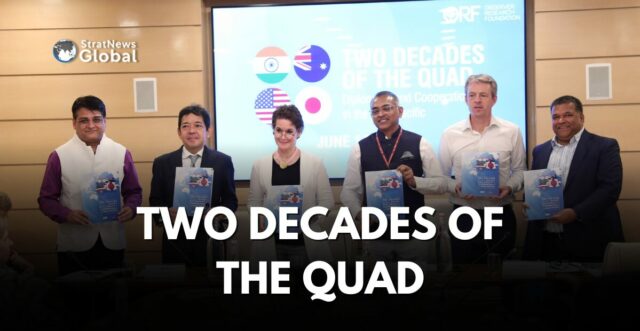Representatives from the four Quad nations – India, the United States, Japan and Australia – gathered at an event in New Delhi to signal a robust commitment to the strategic grouping’s future.
The event was hosted by the Observer Research Foundation (ORF) and the East West Centre for the launch of a report titled “Two Decades of the Quad: Diplomacy & Cooperation in the Indo-Pacific”
Ambitions for the Future
Nagaraj Naidu Kakanur, Joint Secretary for the Americas at India’s Ministry of External Affairs, highlighted India’s eagerness to steer the Quad during its upcoming presidency at the ORF event. “The room is packed to its full capacity, and we are happy to see a strong youth presence in the hall. As we four democracies focus on the next generation of Quad, we are exploring what the next generation of Quad youths can do for the future,.” he said.
“We are focusing on the next generation of QUAD, what the next generation of QUAD youths can do for the future of QUAD” says Nagaraj Naidu Kakanur, JS, AMS, MEA @NagNaidu08
Stay tuned w @StratNewsGlobal @BharatShaktiBSI @nitingokhale @amitabhprevi @Ramananda #QUAD #IndoPacific pic.twitter.com/u1CEcQGTFS
— Resham (@Resham_sng) June 14, 2024
The Evolution of QUAD
The Quadrilateral Security Dialogue, known as the Quad, was initially formed in 2007 as a diplomatic initiative in response to the devastation caused by the Indian Ocean tsunami. Over the past two decades, it has evolved from emergency cooperation into a comprehensive strategic alliance aimed at promoting a free, open, and inclusive Indo-Pacific region.
The Quad’s increasing relevance has been shaped by a shared concern over China’s growing economic and military assertiveness in the Indo-Pacific. Takashi Ariyoshi, Deputy Chief of Mission at the Japanese Embassy, emphasised the grouping’s structure reflects “the vision of the late Japanese Prime Minister Shinzo Abe” for a “democratic security diamond” to uphold the regional rules-based order.
While acknowledging the Quad’s significant growth, with recent annual leader summits institutionalising cooperation, Patricia A. Lacina, Deputy Chief of Mission at the U.S. Embassy, noted at the ORF event that “the Quad has larger ambitions, ranging from the Climate Working Group to initiatives in space.”
With China’s maritime militia menacing disputed territories and its economic coercion impacting trade flows, the Quad aims to offer an inclusive counterweight. Nicholas McCaffrey, Australia’s Acting High Commissioner, highlighted a core principle – the Quad is a platform “where no country dominates and no country is dominated.”
The ORF event in New Delhi signalled all four Quad nations’ commitment to elevating the rules-based regional alliance. As Kakanur stated: “You know it’s great to work in this group because of its flexibility…our thoughts are aligned and we are supportive.”
With India set to hold the next Quad summit. The panel at the ORF made clear the grouping’s intention to be an integral force promoting a free, open, secure and inclusive Indo-Pacific over the next generation.
Research Associate at StratNewsGlobal, A keen observer of #China and Foreign Affairs. Writer, Weibo Trends, Analyst.
Twitter: @resham_sng





